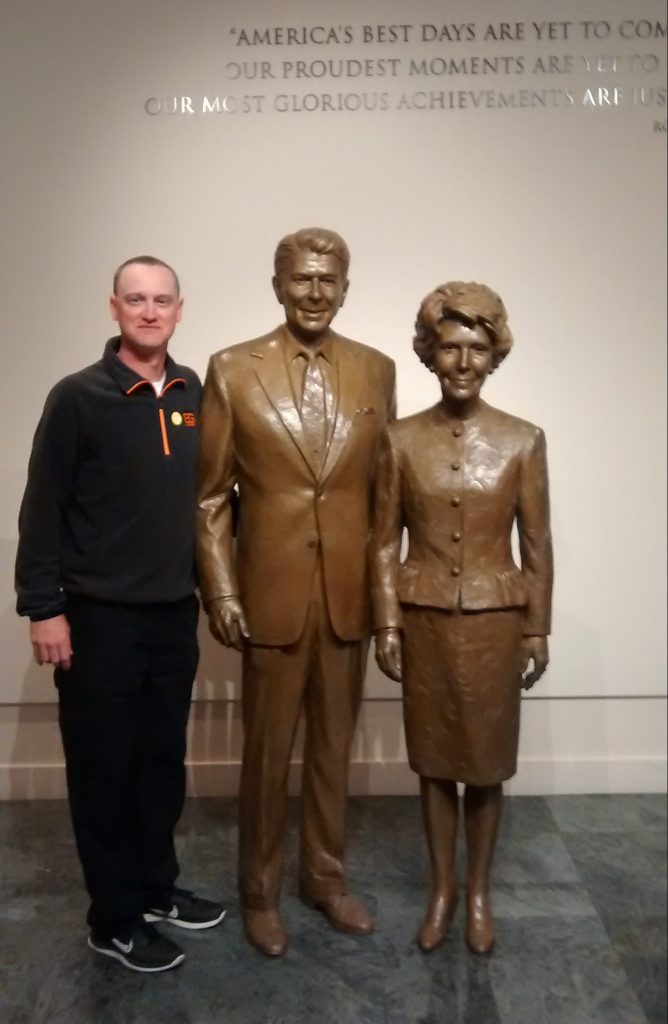Ashbrook Seminars Help Teachers Share Their Love of America
December 24, 2020

When you talk to teachers who attend Ashbrook seminars, what they all have in common is clear: They do what they do for love. They teach history, social studies, or civics because they love history and politics, love America’s story, and love talking about it with the next generation.
Aaron Gray loves teaching so much that he gave up a higher-paying administrative position to teach American history in his hometown. With 12 years of teaching and two years as a high school principal under his belt, Gray decided in 2013 to return to the classroom. He teaches U.S. history to 9th graders, coaches women’s basketball and softball, and manages a learning lab at the high school in Mansfield, Missouri, a small rural town about 50 miles east of Springfield. “Although most students call me ‘Coach Gray,’ my passion is in the classroom talking about all things related to the history of our great nation!” Gray says.
Gray uses primary documents frequently, often finding them in the online library at Ashbrook’s TeachingAmericanHistory website. Its comprehensive collection offers “one-stop shopping” for the speeches, letters, and other writings of earlier Americans, Gray says. “When I go there I trust I’m getting the real thing.”
Through this Ashbrook website, Gray learned about a weekend seminar Ashbrook offered at the Ronald Reagan Presidential Library in Simi Valley, California. “As a child of the 80s, I grew up with Ronald Reagan and have always been intrigued by him,” Gray said. He quickly applied to attend the weekend and was delighted to be accepted.
The weekend proved even more interesting than he expected. “So many times you go to professional development, it’s a lecture format. They hand you notes and a printed power point to take home. It was different to sit around the table with other teachers, reading and highlighting and making notes on the primary documents” that Ashbrook mailed to participants before the seminar, allowing the teachers to prepare for it.
The best part was talking with fellow teachers. “The facilitator started us off with basic questions that allowed participants to contribute, and we got to hear what other teachers had to say. I really enjoyed talking with the other teachers, not only during the six hours we spent in the seminar room, but also during the dinners and downtime. Participants were a cross-section of different regions of the country—Massachusetts, Connecticut, Washington state.”
Discussion continued after the weekend was over. “I’ve been going through emails with the teachers I met. We’re talking about the readings we discussed, asking each other, ‘How do you teach this one?’” Teachers share ideas about how to build on the readings with discussions, writing assignments, and projects.
Gray appreciated the seminar facilitator, Professor Joseph Postel of the University of Colorado at Boulder Springs. Postel did his undergraduate studies in Ashland as an Ashbrook Scholar. “Postel is a great guy; I’d attend any seminar he led.” Unlike those “college professors who try to talk above you,” lecturing and intimidating teachers with their considerable knowledge, “Joe was very down to earth, giving us a clear focus point for discussion.”
Ashbrook bases both its undergraduate and graduate seminars on the belief that all citizens can understand America’s past as those who lived it understood it. The political challenges earlier Americans faced foreshadow the challenges we face today, and the principles of America’s Founding should continue to guide our response to them. High school students, their teachers, and college professors alike can and should join in discussion of the great legacy of American democracy.

